Total War: Pharaoh crosses the series with Game of Thrones as you go from court gossip to ruler

Ramesses makes his rounds as he arrives at court, shaking hands, greasing some palms, and sharing choice morsels of gossip. Everyone likes Ramesses at the Hittite court, for he is a very fair and generous judge and always has the most entertaining rumors to offer. Today is the day this Egyptian exile has been waiting for. Years of backdoor politicking, plotting to gain a position, and defending it from jealous men will finally pay off. Today’s target is none other than the Hittite Great King himself – and this will be the first step towards Ramesses’ own ascension.
See, in Total War: Pharaoh, war may always be the final tool in politics, the one you use to take your throne, but the art of gossip is not to be underestimated. When you join one of the two courts in the game – the Hittite or Egyptian one – you gain access to court actions. Usually two per turn, unless you’ve got some special bonuses. Most of these actions will be spent gossiping with one of the court officials – people with special roles granting them influence and power. Gossip is the most reliable way to build favor and rapport with these officials, which in turn can be used to make them do your bidding. These can be completely innocent things – you ask the Viceroy of Nubia for access to his recruitment pool, for example, gaining the ability to recruit the famed elite archers of the country. They may be nefarious as well, though: You can plot to discredit your rivals or murder them to force them to vacate their court position, claiming it by yourself in the aftermath.
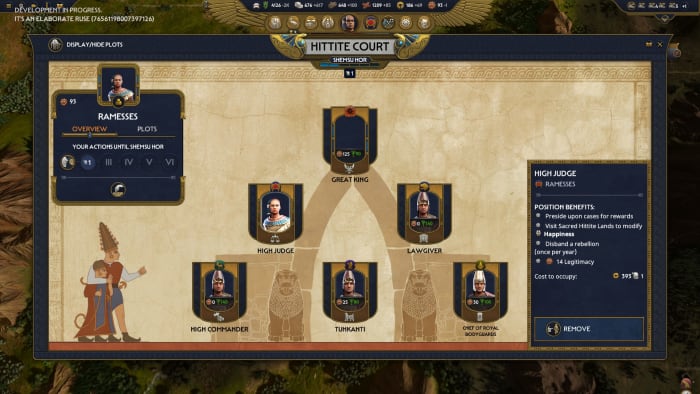
You can take over a position at court, gaining the unique actions of the role. Keep in mind, though, that having a court position puts a target on your back as well.
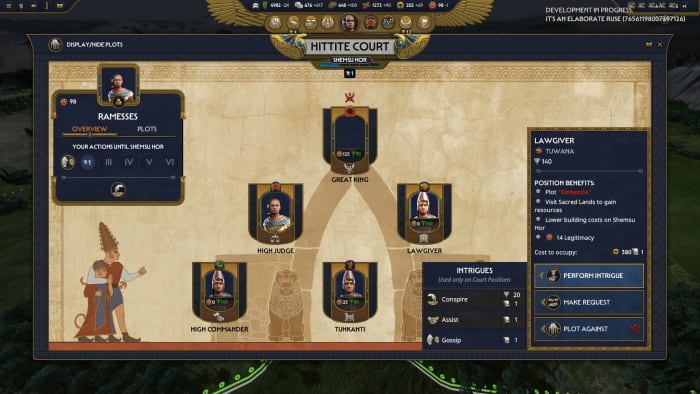
You can interact with court officials even if you don't have a position yourself. Share some gossip to earn favor or assist them with a plot.

Once you have enough favor, you can request various forms of assistance from court officials. In this case, you obtain some elite units for your recruitment pool.
These plots are resolved after every sixth turn, when one year of time has gone by. Pharaoh’s campaign is structured this way to mirror the ancient Egyptian year, which always began with Shemsu Hor – the Pharaoh’s journey up the Nile. Aside from resolving plots, Shemsu Hor is when every leader’s special commandment gains a bonus effect. Ramesses, for example, can usually use it to attack from the Forced March stance, but on Shemsu Hor he can use it to add elite units to his recruitment pool.
What Ramesses has planned for this Shemsu Hor is to undermine the Great King. This court action steals a big chunk of Legitimacy from the ruler and transfers it to Ramesses – and thanks to his diligent gossiping over the last years, he’s got so much favor stored up that he can combo various court actions to enhance the chances of this plot to their maximum. It’s important that this works, for Legitimacy is required to claim a throne – merely killing its current owner isn’t quite doing the trick, you see. You need to build up your prestige over time, obtaining enough Legitimacy to be recognized as a worthy claimant. Only then may you throw the realm into the turmoil of civil war.
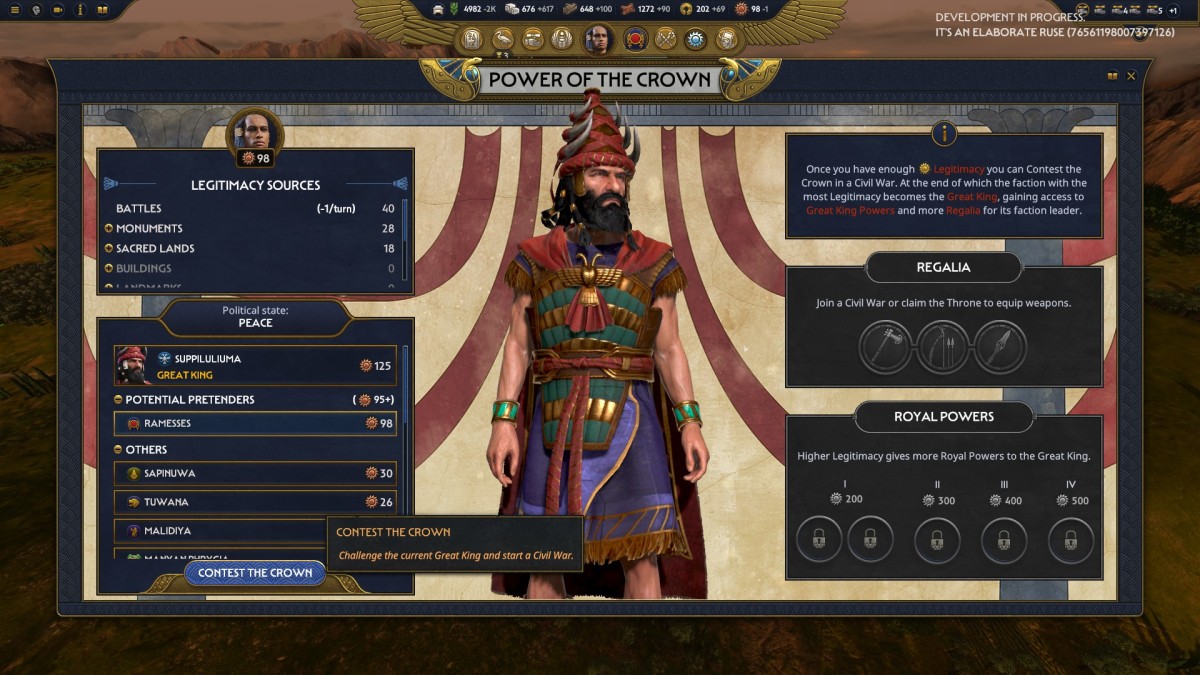
Over the course of this campaign in a preview version of Total War: Pharaoh, Ramesses built up a reputation as a great warrior, gaining Legitimacy through conquest and battle. He’s also shown himself to be a merciful and benevolent ruler of his domain, though, choosing to emulate a queen of old known for these qualities. This is another mechanic of the campaign: Characters choose a previous ruler’s legacy that they’d like to honor, granting them access to special mechanics. In this case, keeping his population and vassals happy will allow Ramesses to automatically gain gifts from them or demand such tribute manually – be it resources, ancillaries, or units, they do everything for a benevolent ruler. Whatever your play style, these extra assets come in handy.
In a previous run, Ramesses followed Hatshepsut’s economic legacy, allowing him to send a caravan into the world to buy and sell resources as well as gain unique ancillaries. He discovered that he could take the figs produced in his home province, worth about 200 food resources apiece, and trade them for olive oil in the neighboring province, which provides 800 food apiece, at a rate of 3:1, meaning he’d make a profit of 200 food with a very short travel time – guess whose army suddenly grew a lot bigger than it would otherwise have been able to?
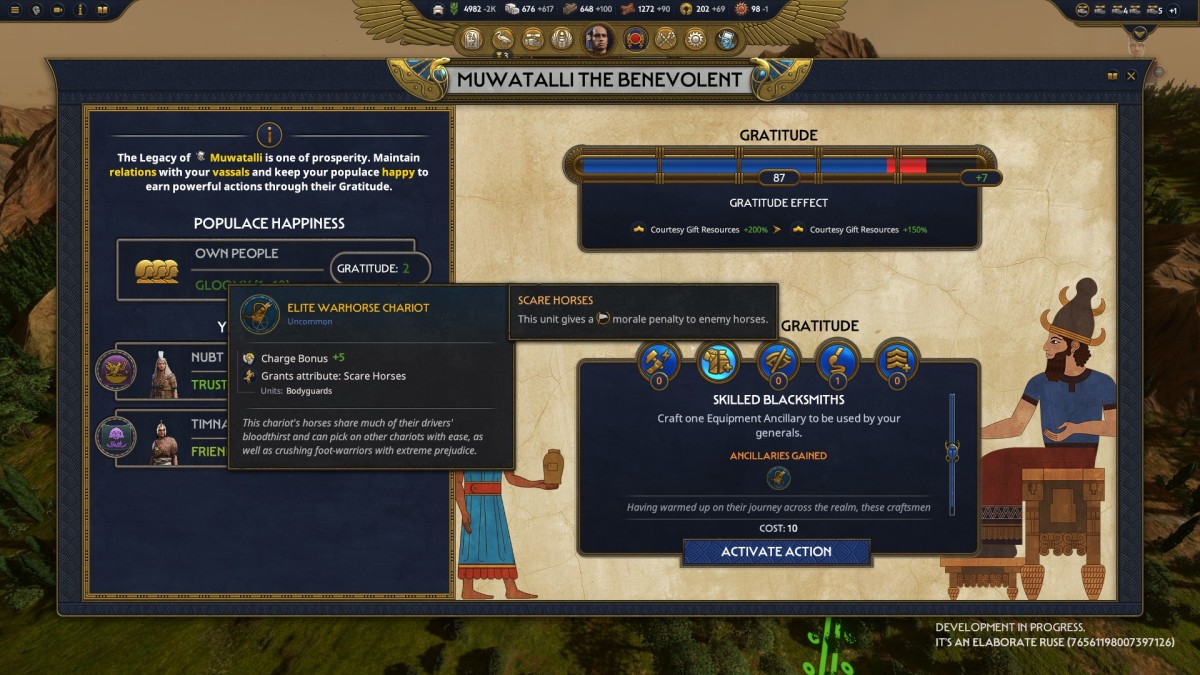
This is a great example of how these campaign mechanics interact with characters of different types and how they make playthroughs completely unique. Ramesses is a military man and so his faction is focused on this area, but that doesn’t mean that he can’t make use of this feature in his own way.
Back to our present Ramesses, though, who ended up in the middle of Anatolia thanks to the randomized start position feature, one of many tools to enhance replayability in Pharaoh. His decision to join the Hittite court as opposed to the Egyptian was far-reaching: He couldn’t use legacies of Egyptian rulers, thus settling on a Hittite one, and the way he earns Legitimacy is much more battle-focused than it would have been, had he joined Egypt. But, since Ramesses is a military character, that’s fine. His conquests and defensive battles against the Sea Peoples, which show up relatively early on in smaller waves, have earned him almost enough Legitimacy to challenge the Great King. The final jump is the political scheme he’s put in place earlier – if the king is successfully undermined, Ramesses will be able to declare his claim.
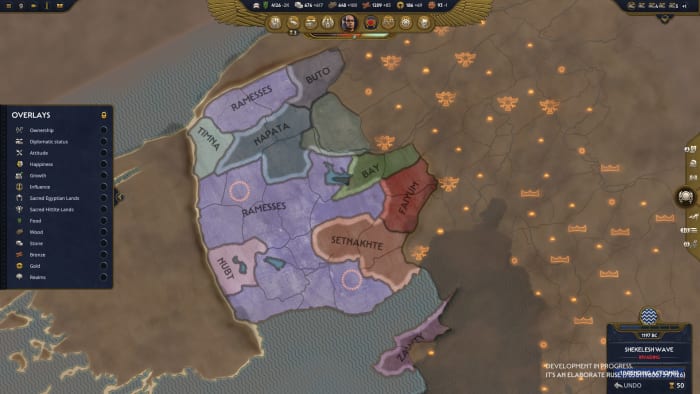
Random starting positions are an absolute game changer. This is my run Anatolian run with Ramesses after 50 turns: I control two cult centers and enough sacred lands to pose a challenge to the Great King. Some smaller neighbors are my vassals, but the Sea Peoples are starting to cause trouble.
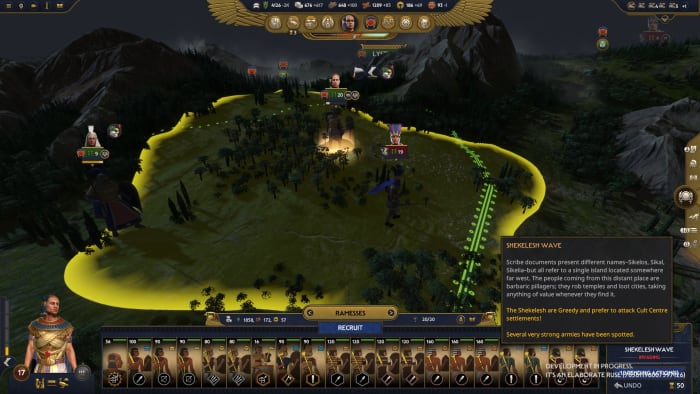
There are actually different tribes of Sea Peoples, which all display different behavior. These lads from Sicily prefer to go after rich cult centers.

A research tree will unlock additional production bonuses as well as things like more slots in your pantheon of deities.

Commands gain an additional effect when used on Shemsu Hor.
I have to commend Creative Assembly Sofia for how these systems have all been implemented. There are many of them, but none of them feel useless or like a bother. Instead, they all directly or indirectly feed back into your core campaign goal of obtaining one of the two great thrones.
Going down from this political layer into the campaign itself, players of Total War: Troy will be familiar with how a lot of stuff works, such as the resource-based economy with food, gold, bronze, stone, and wood. Another important resource is manpower – have too little of it and you can’t construct buildings, have too much and the populace becomes unruly. Managing cities is quite rewarding, because you really desperately need those resources – not just for your main army, but you also want to finance your political activity and trade. And if you have a coastline, you better believe you’ll want troops in those cities, because the danger from the waves is real.
One of the coolest additions to the provinces in Total War: Pharaoh are Outposts, which have been inspired by earlier Total War entries, but take things a little further. Each province has a few building spots for these and you can decide what you want to construct – and this goes deep, because these decisions are actually quite impactful. Monuments will give you Legitimacy, which is needed for your campaign goal. Garrisons can house troops with reduced upkeep that will automatically reinforce a besieged city – useful for those coastal towns mentioned earlier. Traders will improve resource production, which is self-explanatory, really. Then there are outposts that add to the movement range of visiting armies, there are temples you can dedicate to one of your gods, and there outposts that make you immune to attrition. The thing is: You want them all, most of the time.
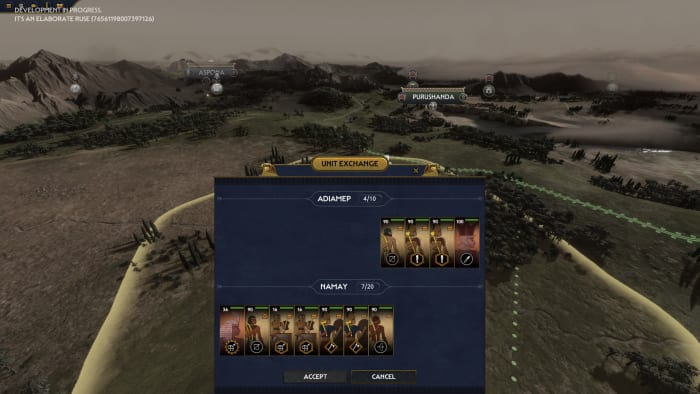
Forts are quite useful for protecting vital settlements or preparing an invasion, but won't do anything to defend other Outposts.
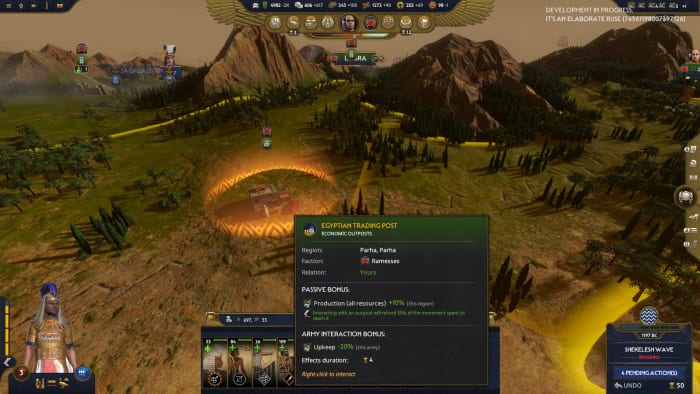
Trading Posts not only generate a positive effect on your economy when built, a visiting army can reduce its upkeep costs by a significant amount.

Building a chain of Trading Posts along routes your armies march again and again will allow you to keep your costs down, thus enabling you to build larger forces.
I’ve personally found myself to be drawn to build trade posts along routes my armies often travel along, because visiting one of these will reduce upkeep costs by a lot for several turns, which helps lessen the strain on your economy the military causes significantly. A mix of these with the outposts that refresh movement range will allow your troops to traverse massive distances in a single turn, which you’ll find useful to catch raiders. This adds a very neat layer of depth to the campaign map – but raiders will be annoying by targeting and razing these structures, so be careful in how you place them. If you’ve dedicated a general to a certain god or goddess and their temples get destroyed, that character will be penalized for your impiety.
Speaking of religion, this is another very thematic sub-system that adds a unique character to each playthrough, because you’re not stuck with the same gods all the time – depending on which cults you discover out in the world, you can elevate certain gods of the Egyptian, Hittite, and Canaanite pantheons to be important to your faction. The higher your piety for these gods becomes, the better your bonuses are going to be. You can decide on your cults based on role-playing or simply on the benefits they provide – case in point, our Hittite Ramesses chose to workshop the Hittite goddess Arinna, who provides more happiness to the realm among other things, supporting his choice of legacy.
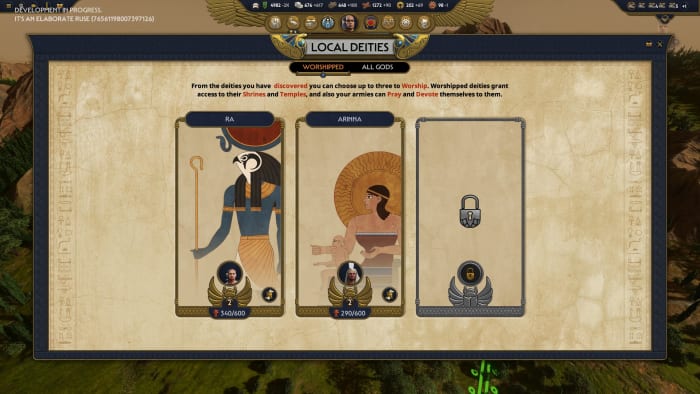
Elevating the cults of certain gods will unlock different bonuses for your realm and allow you to dedicate generals to their worship, giving those characters benefits.

In this case, I chose to add Arinna to my elevated deities, because her bonus to happiness aligned very nicely with the Ancient Legacy I took.

Depending on how you skill your character, you unlock different titles, which in turn lead to active and passive abilities. Equipment is important as well, changing the type of a general's bodyguard. In this case, Ramesses rides to battle in a squadron of light chariots crewed by archers.

Once a civil war has begun, you can lay claim to legendary equipment used as royal regalia.
In a way, all of these systems allow you to craft a build like in a RPG. Not to speak of the literal RPG-inspired character menu that enables you to kit out your generals with equipment, which actually changes their bodyguard unit (amazing!), and titles that grant them bonuses.
And that’s just the tip of the iceberg, really, because all of these factors pale in comparison to all the customization options available to make a campaign really your own. I already mentioned the randomized starting positions, and that’s certainly one of the more impactful ones, as you might imagine. It changes which factions you meet early on, which court you may want to join, which gods you meet, and even your army compositions, because of the way regions offer different troop types.
But you can also modify AI behavior, starting resources, which gods are available, whether trade is allowed or not, which natural disasters can occur, how strong the Sea People invasions will be, and so on – no guarantee that they’ll be the same in the final version, but you can find all the options as they were in the preview build below. All of them also have explainers about what exactly the modifiers do.
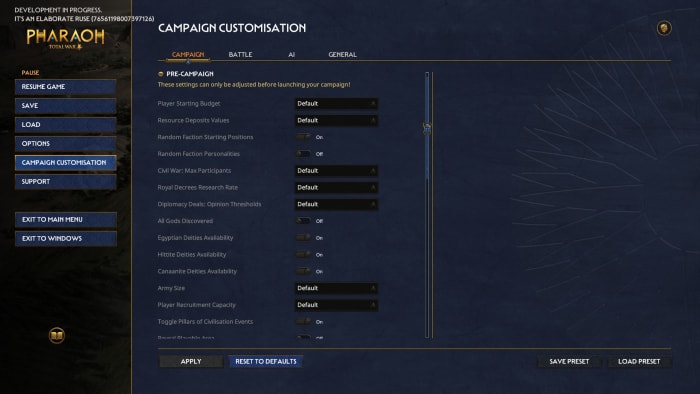





Frankly, I can count the amount of battles I manually played during my runs on my two hands – whenever I hit the turn limit of the preview build, I just wanted to jump into another scenario to try out different combinations of settings. This feels like heresy to say, but you could likely get a ton of fun out of Total War: Pharaoh’s campaigns without ever loading into the battlefield – there is so much to explore here without it ever feeling overwhelming. It’s not quite Crusader Kings, but in a way it has some of those vibes, and that’s quite refreshing.
No other Total War allows you to be Gossip Girl, Littlefinger, and Alexander the Great at once.
Total War: Pharaoh will be released on October 11, 2023, for PC. For more on the upcoming title, check out our interview with game director Todor Nikolov.
